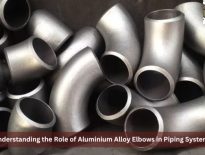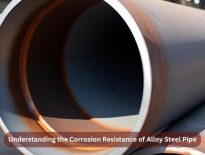When it comes to piping systems, flanges play an essential role in connecting pipes, valves, pumps, and other equipment. But what exactly are aluminium alloy flanges? Why do industries increasingly prefer them over traditional steel flanges? And how do they benefit your projects?
This blog will answer these questions by diving into the properties, types, and applications of aluminium alloy flanges. We’ll also explain why they have become a critical component in industries ranging from aerospace to food processing.
What Are Aluminum Alloy Flanges?
Aluminium alloy flanges are mechanical connectors made primarily from aluminium mixed with other elements like copper, magnesium, or zinc. This combination creates a lightweight yet strong material ideal for flange manufacturing.
Unlike steel flanges, aluminium alloy flanges offer superior corrosion resistance and excellent thermal conductivity. These qualities make them especially suitable for environments where weight reduction and resistance to corrosion are critical.
Why Are Aluminium Alloy Flanges Preferred?
You might ask, why choose aluminium alloy flanges over conventional steel or stainless steel flanges? Here are some key reasons:
-
Lightweight: Aluminium alloys weigh significantly less than steel, reducing the overall weight of piping systems, which is crucial in aerospace and automotive sectors.
-
Corrosion Resistance: Aluminium naturally forms a protective oxide layer that prevents rust, making these flanges perfect for marine and chemical applications.
-
Thermal Conductivity: Their ability to dissipate heat quickly is valuable in heat exchanger and HVAC systems.
-
Cost-Effective: While aluminium alloys can be pricier upfront, their durability and low maintenance reduce long-term costs.
-
Ease of Fabrication: Aluminium alloys are easier to machine and weld, allowing for custom flange designs and faster production.
What Types of Aluminium Alloy Flanges Are Available?
Different flange types serve various purposes in piping systems. Common aluminium alloy flanges include:
-
Weld Neck Flanges: Known for their strength and used in high-pressure applications.
-
Slip-On Flanges: Easy to install and cost-effective for moderate pressure systems.
-
Blind Flanges: Used to close pipe ends securely.
-
Threaded Flanges: Designed for pipes without welding, ideal for hazardous environments.
-
Socket Weld Flanges: Provide leak-proof connections for small-diameter piping.
Where Are Aluminium Alloy Flanges Used?
Aluminium alloy flanges find application in many industries due to their unique properties. Some notable uses include:
-
Aerospace: Their lightweight nature reduces aircraft weight, improving fuel efficiency.
-
Marine: Excellent corrosion resistance helps withstand harsh saltwater environments.
-
Automotive: Used in exhaust and cooling systems for better heat management.
-
Food & Beverage: Aluminium’s non-toxic surface ensures hygiene and easy cleaning.
-
HVAC Systems: High thermal conductivity supports efficient heating and cooling.
-
Chemical Processing: Resistant to many corrosive substances, enhancing safety and durability.
How Does MaxSteels Deliver Quality Aluminium Alloy Flanges?
At MaxSteels, we understand the critical role aluminium alloy flanges play in your projects. That’s why we focus on:
-
Using premium raw materials sourced from trusted suppliers.
-
Manufacturing flanges that meet international quality standards.
-
Offering custom sizes and grades tailored to your specific needs.
-
Providing technical support and timely delivery across India.
Our aluminium alloy flanges ensure reliable performance, safety, and longevity for your piping systems.
Why Should You Consider Aluminium Alloy Flanges for Your Next Project?
Choosing the right flange material can impact your project’s efficiency, cost, and durability. Aluminium alloy flanges combine the best of lightweight design and corrosion resistance, making them a smart choice for modern industrial challenges.
By investing in quality aluminium alloy flanges from MaxSteels, you benefit from expert manufacturing, strict quality control, and competitive pricing.
Conclusion
What are aluminium alloy flanges? They are innovative, durable, and versatile connectors that meet the evolving needs of many industries. Their unique properties make them indispensable in environments where weight, corrosion resistance, and thermal performance matter most.



